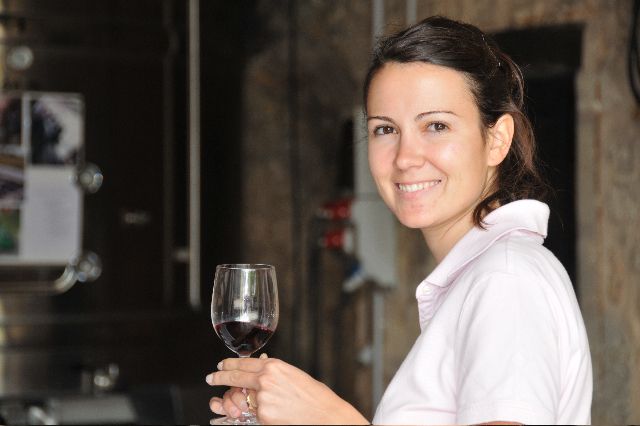
There may be a large gender divide in many workplaces, but in the realm of wine, women have been steadily rising to the top. Not only do female consumers outweigh that of men, the number of female winemakers and sommeliers continue to rise every year. There are probably countless reasons as to why women are reigning supreme on the vineyard, but we’ll leave reasoning to the 10 talented ladies we recently spoke with. From California to Italy, from winemakers to sommeliers, these women’s stories are funny, touching, kismet, and inspirational. Plus, their favorite wines make a pretty amazing shopping list.
What started as a small feature is now a full-sized series, so make sure to stay tuned to learn about each and every one of these 10 women in wine. Next up is Diana Garcia Gonzalez, winemaker with Château Corconnac Cru Bourgeois and Château Teynac in Bordeaux, France.
Family-run since 1989, Château Teynac started out as a small 4.5 hectare (around 11 acres) vineyard in the middle of the St-Julien de Beychevelle village. Soon they acquired the nearby Château Corconnac and were able to purchase many more acres of vineyards to be what they are today. With 12.5 hectares (30 acres) in St. Julien and another eight hectares (around 19 acres) in Haut-Médoc, they have made quite the name for themselves in Bordeaux, France. The family brought in winemaker Diana Garcia Gonzalez in 2008 for both Château Teynac and Château Corconnac, who quickly started making a big impact. She launched innovations like a new cellar, stainless steel tanks (to allow for parcel-by-parcel winemaking), and new harvesting machines—she's also apparently a genius when caring for vines. Through her expertise and talents, she has helped make Château Teynac and Château Corconnac wines some of the best in the appellation.
JustLuxe: What got you started in the industry?
Diana Garcia Gonzalez: I’m the daughter and granddaughter of Spanish winemakers. I grew up in a vineyard in the region of Requena, which is about 40 miles away from the coast of Valencia. I always admired the work of my father—his artistic lifestyle and constant contact with, and awareness of, nature. I moved to France for my studies in 2005, and then in 2007, I decided to settle down in Bordeaux.
JL: Who are some of your heroes?
DGG: I admire my father, he is a well-regarded oenologist in the world of Cava (Spanish sparkling wine). He actually created the Cava appellation in Requena, and helped raise awareness of the region and its high-quality wines. I also have so much respect for Jean-Claude Berrouet (my father-in-law and mentor). He was my internship supervisor at the Etablissements Moueix in St-Emilion in 2006. I like the fact [that] he’s humble and sensitive, and I appreciate his winemaking philosophy.
JL: Is there a female figure in the wine world whom you consider to be the most inspiring and/or influential?
DGG: Of course! I admire the work of the women in charge of well-known châteaux who create beautiful fine wines that are elegant and possess finesse—wines that reflect the female winemaker’s personality. Some examples are Isabelle Davin (of Leoville Poyferré), Stéphanie Danglade (of Pichon Lalande), Caroline Artaud (of Fourcas Hostein), and Paz Espejo (of Château Lanessan). They are all inspiring winemakers and wonderful individuals!
JL: Considering more women tend to list wine as their favorite alcoholic drink compared to men, why do you think it has taken so long for women to break into the industry? How has the climate for females in the wine industry changed?
DGG: Wine isn’t just a beverage or a type of alcohol, it’s a cultural act. Perhaps women have different tendencies that cause them to be more interested in wine. I think it has taken so long because there just isn’t enough of an interest in wine—especially among young adults.
JL: As a woman in the field, would you prefer to be "just another winemaker/sommelier" or do you find power in the attention gained from being a female in the industry?
DGG: I’m proud to be a woman in this industry, but I don’t want to be recognized solely because of my gender. Rather, I want to be thought of and judged for my work. All of us, men and women, have a role to play. We complement each other, and together, we can enrich the world of wine.

JL: What do you like the most about your wine/wine lists?
DGG: In my opinion, a wine is successful when it speaks for itself, when the fruit really shines. Each wine should be in harmony with its year. Lighter vintages are aromatic, fruity and fresh; while bigger, bolder vintages are richer, more complex and structured. The wine should always have soft, round and elegant tannins. In order to attain this, we need to alter our vinification and farming methods (depending on the weather, grape growth, etc.) in order to get the best from our fruit each year.
JL: Do you have a favorite wine?
DGG: A great wine will take you on a trip across time, to unknown lands; it will allow you to discover and explore during a meal. I love wines that evolve in your glass over the course of a meal, all the while telling you a story (of the climate, terroir, grapes and people of the region from which it hails). I love chardonnay from Burgundy and, as for reds, I’m a big fan of Pomerol Merlots. My coup de coeur, absolute favorite, is Cabernet Sauvignon from Saint-Julien.









